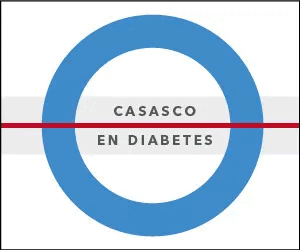Symposium: Therapeutic approach. Meal patterns and beta cells: The Case of Gabriela
DOI:
https://doi.org/10.47196/diab.v55i3Sup.503Keywords:
diabetes, dietsAbstract
When recommending meal planning to patients, we try to promote and sustain healthy eating patterns that lead patients to a better health status. However, we must remember, while making a recommendation, that each person's diet is based on hard to change environmental, economic, social, and cultural factors, which we must be aware of and respect before prescribing what we consider a suitable diet. By making few changes to the patient's previous patterns, we will ensure a greater adherence to change, which might be progressively implemented.
Among nowadays most frequently used diets, the Mediterranean diet is the one that shows more benefits for patients, for instance, it shows clinical benefits such as anti-inflammatory gain, and it's easy to follow and stick to; however, this diet is usually considered more expensive than others. It has been widely studied and there is evidence on long term populations; thus, data about its benefits is conclusive.
Another meal planning that is gaining more and more followers and presenting more benefits is the vegetarian diet and all its variants. People who start vegan diets and plant-based diets must receive appropriate nutritional education by specialists to avoid nutrient deficiency. Diets that require greater medical control, due to possible complications, are the ketogenic diet, the very-low-calorie diet (VLCD) (400 to 800 daily calories) and intermittent fasting.
They have all proven to be short-term beneficial, but there are still plenty of unknown aspects if they are long-term maintained. For patients who need to lose weight, evidence shows that any diet in which patients succeed in reducing daily calorie intake would be beneficial, regardless of macronutrients percentage indicated on the diet plan. Lastly, only weight loss and low-glycemic index diets have shown evidence regarding beta cells preservation and their ability to secrete insulin.
References
I. Chen Z, et al. Changes in plant-based diet indices and subsequent risk of type 2 diabetes in women and men: Three U.S. Prospective Cohorts. Diabetes Care 2021;44:663-671.
II. Cleveland Clinic Journal of Medicine volume 84 • supplement 1: S1-S14
III. Orlich MJ, Fraser GE. Vegetarian diets in the Adventis Health Study 2: a review or initial published findings. Am J Clin Nutr 2014;100(suppl):353S–8S
IV. American Journal of Medicine 2020; 133:1126-1134.
Downloads
Published
How to Cite
Issue
Section
License
Copyright (c) 2021 on behalf of the authors. Reproduction rights: Argentine Diabetes Society.

This work is licensed under a Creative Commons Attribution-NonCommercial-NoDerivatives 4.0 International License.
Dirección Nacional de Derecho de Autor, Exp. N° 5.333.129. Instituto Nacional de la Propiedad Industrial, Marca «Revista de la Sociedad Argentina de Diabetes - Asociación Civil» N° de concesión 2.605.405 y N° de disposición 1.404/13.
La Revista de la SAD está licenciada bajo Licencia Creative Commons Atribución – No Comercial – Sin Obra Derivada 4.0 Internacional.
Por otra parte, la Revista SAD permite que los autores mantengan los derechos de autor sin restricciones.







































